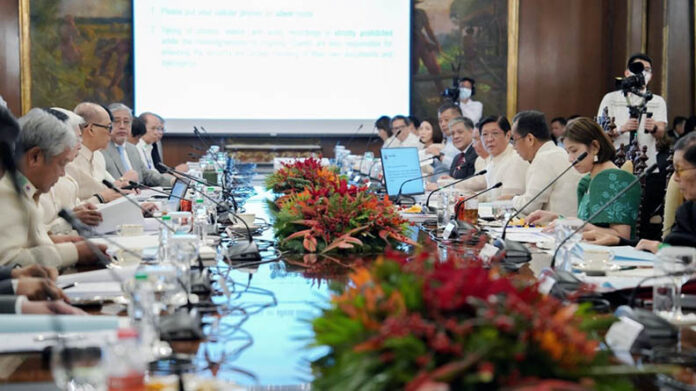
-
President Ferdinand Marcos Jr. has approved the extended temporary reduction of import duty on various commodities, including pork and rice, to address supply issues and ease the impact of inflation
-
A proposed executive order will extend validity of EO No. 171, issued in May by the past administration, which lowered the most-favored nation tariff rates on fresh, chilled, and frozen pork, corn, rice and coal until December 31, 2022
-
The proposed EO extends the tariff cuts on pork, corn and rice until December 31, 2023
-
The rate for coal will go beyond December 31, 2023 subject to review each semester
-
Socioeconomic Planning Secretary Arsenio Balisacan says the extension will “provide relief to poor and vulnerable segments of the Filipino population whose welfare is reduced [by] high inflation”
President Ferdinand Marcos Jr. has approved the extended temporary reduction of import duty on various commodities, including pork and rice, to address supply issues and ease the impact of inflation.
A proposed executive order, endorsed by the National Economic and Development Authority Board, will extend validity of EO No. 171, which lowered the most-favored-nation (MFN) tariff rates on fresh, chilled, or frozen pork, maize, rice, and coal until December 31, 2022.
Under the proposed extension, the tariff cuts for pork, corn, and rice will be until December 31, 2023, while that for coal will go beyond this date, subject to review every semester.
The endorsement by the NEDA Board Committee on Tariff and Related Matters was approved on December 16 during a board meeting presided over by Marcos, its chairman.
Socioeconomic Planning Secretary Arsenio Balisacan said in a statement the extension will “provide relief to poor and vulnerable segments of the Filipino population whose welfare is reduced [by] high inflation.”
“Through this policy, we shall augment our domestic food supplies, diversify our sources of food staples, and temper inflationary pressures arising from supply constraints and rising international prices of production inputs due to external conflict,” he said.
EO No. 171, signed last May, reduces import duties on the following commodities: fresh pork, chilled pork or frozen pork at 15% (in-quota) and 25% (out-quota); corn at 5% (in-quota) and 15% (out-quota); rice at 35% (in-quota and out-quota); and coal at zero duty.
EO 171 noted the need to cut tariffs on imported coal and corn to mitigate and stabilize the impact of inflationary pressures brought about by the Russia-Ukraine war by expanding supply sources and reducing the prices of key commodities.
The extension of the reduced import duties for pork and rice, meanwhile, is “to capitalize on the gains already achieved” by previous EOs, all for the purpose of augmenting the supply of these commodities in the country and maintain lower prices.
Based on the NEDA Board’s recommendation, the reduced tariffs on pork, corn, and rice will revert to their original rates after December 31, 2023. The zero duty on coal, meanwhile, will apply beyond December 31, 2023.




